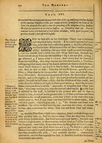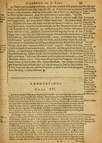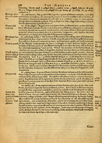He teacheth the rich to procure Heaven with their riches. (14) And being therefore derided of the covetous Pharisees (who saw temporal riches promised in the letter of the Law) he showeth that now is come the preaching of the Kingdom of God, howbeit the Law for all that in no jot shall be frustrate. (19) Foretelling them also, that the covetous Jews shall be denied of their father Abraham, when poor Lazarus (the penitent Gentile) shall rest in his bosom.
AND he said also to his Disciples: There was a certain rich man that had a c bailiff: and he was ill reported of unto him, as he that had wasted his goods. 2And he called him, and said to him, What hear I this of thee? render account of thy c bailiffship; for now thou canst no more be bailiff. 3And the bailiff said within himself, What shall I do, because my Lord taketh away from me the bailiffship? dig I am not able, to beg I am ashamed. 4I know what I will do, that when I shall be removed from the bailiffship, they may receive me into their houses. 5Therefore calling together every one of his Lord’s debtors, he said to the first, How much doest thou owe my Lord? 6But he saith, A hundred pipes of oil. And he said to him, Take thy bill and sit down, quickly write fifty. 7After that he said to another, But thou, how much doest thou owe? Who said, A hundred quarters of wheat. He said to him, Take thy bill, and write eighty. 8And • the Lord praised the bailiff of iniquity, because he had done wisely; for the children of this world, are wiser than the children of light in their generation. 9And I say to you, Make unto you friends of the [a] mammon of iniquity that when you fail, • they may receive you into the eternal tabernacles. 10He that is faithful in the least, is faithful in the greater also: and he that is unjust in little, is unjust in the greater also. 11If then you have not been faithful in the unjust mammon, with that which is the true who may credit you? 12And if you have not been faithful in other means, that which is yours, who will give you? 13 * No servant can serve two masters; for either he shall hate the one, and love the other; or cleave to one, and contemn the other. You can not serve God and mammon.
14And the Pharisees which were covetous, heard all these things: and they derided him. 15And he said to them: You are they that justify yourselves before men, but God knoweth your hearts, because that which is high to men, is abomination before God. 16 * The Law and the Prophets, unto John. From that time the Kingdom of God is evangelized, and every one doth force toward it. 17 * And it is easier for Heaven and earth to pass, than one tittle of the Law to fall. 18 * Every one that dismisseth his wife, • and marrieth another, committeth advoutry; and he that marrieth her that is dismissed from her husband, committeth advoutry.
19There was a certain rich man, and he was clothed with purple and silk: and he fared every day magnifically. 20And there was a certain beggar called Lazarus, that lay at his gate, full of sores: 21desiring to be filled of the crumbs, that fell from the rich man’s table, * but the dogs also came, and licked his sores. 22And it came to pass that the beggar died, and was carried • of the Angels into • Abraham’s bosom. And the rich man also died: and he was buried in Hell. 23And lifting up his eyes, when he was in torments, he saw Abraham a far off, [b] and Lazarus in his bosom; 24and he crying said, Father Abraham, have mercy on me, and send Lazarus that he may dip the tip of his finger into water for to cool my tongue, because I am tormented in this flame. 25And Abraham said to him, Son, remember that thou didst receive [c] good things in thy lifetime, and Lazarus likewise evil; but now he is comforted, and thou art tormented. 26And beside all these things, between us and you there is fixed • a great c chaos: that they which will pass from hence to you, may not, neither go from thence hither. 27And he said, Then, father, I beseech thee that thou wouldest send him unto my father’s house, for I have five brethren, 28for to testify unto them, • lest they also come into this place of torments. 29And Abraham said to him, [d] They have Moyses and the Prophets; let them hear them. 30But he said, No, father Abraham, but if some man shall go from the dead to them, they will do penance. 31And he said to him, If they hear not Moyses and the Prophets, neither if one shall rise again from the dead, will they believe.
Footnotes
- ↑ Mammon (saith St. Jerom q. 6. ad Algas.) in the Syriac tongue signifieth riches. Mammon of iniquity, because they are often ill gotten, or ill bestowed, or occasion of evil, or at the least worldly and false, and not the true heavenly riches.
- ↑ Lazarus in Abraham’s bosom, and rest, but both in hell, and not in the Kingdom of Heaven before Christ. Hiero. ep. 3. Epithoph, Nepot.
- ↑ To be in continual pleasures, ease, wealth, peace, and prosperity in this world, is perilous, and a sign of pains in the next. S.Heiro.
- ↑ Abraham had knowledge of things in earth which were not in his time; as that they had Moyses and the Prophets books which he never saw. August. de cura pro mor. c. 14.
ANNOTATIONS. CHAP. XVI.
↑ 8. The lord praised.) This man’s deceiving his master is not praised, nor we warranted by his fact to gain unjustly for to have wherewith to give alms: but his prudence, in that he provided so substantially for himself whilest his master’s goods were in his hands, is commended, not for a virtue, but for a worldly policy: and proposed as an example of the careful provision that rich men (who are God’s stewards in earth) should make for their souls, against they be put out of their bailiffship and be called to account, which is the day of their death: and for a condemnation of faithful men’s folly and negligence, that being assured they shall out of their offices, and well knowing they might gain salvation by their money, have so little regard thereof.
↑ 9. They may receive.) A great comfort to all great alms-men, and a wonderful force and virtue in alms, which beside the merit of the work of mercy, which (as in other places of Scripture is said) purgeth sin and gaineth Heaven, procureth also not only the prayers of their beadsmen in earth, but their patronage in Heaven also. Whereby also the prayers of Saints for the living, and namely for them to whom they were beholding in their life, are proved. Yea and that they be in such favour with God, that they may and do receive their friends which were once their benefactors, into their mansions in Heaven, no less than the farmers whom the ill steward pleasured, might receive their friend into their earthly houses. Which also insinuateth to us, that alms bestowed specially upon holy men, who by their merits and prayers are great in God’s grace, may much more help us than our charitable deeds done upon vulgar men in necessity, though that be of exceeding great merit also. See all this in these Doctors following. Hiero. quaest. 6. Algas. tom. 3. Ambros. in Luc. August. serm. 35 de verb. Do. ch. 1. Gregor. moral. lib. 21. ch. 14. August. lib. 2 qu. Evang. qu. 34. Chrys. hom. 33. ad Po. Ansioch. to. 5.
↑ 18. And marrieth.) The good of Marriage throughout all Nations and men, is in issue and fidelity of chastity, but among the people of God it consisteth also in holiness of Sacrament: whereby it cometh to pass that is a heinous crime to marry again, though there be a divorce made, so long as the parties live. Aug. de bono conjug. c. 24 to. 6. See the Annotations upon Mark 10, 11.
↑ 22. Of the Angels.) Angels carry good men’s souls to Heaven now, as they did then his to Abraham’s bosom. See the reward of poverty, affliction, and patience: and on the contrary, the end and reward of wealth joined with unmercifulness. Note also here that at the day of every man’s death there is a particular judgement, and therefore the soul sleepeth not, nor hangeth in suspense till the general judgement.
↑ 22. Abraham’s Bosom.) The Bosom of Abraham is the resting place of all them that died in perfect state of grace before Christ’s time, Heaven before being shut from men. It is called in Zachary, a lake without water, and sometimes a prison, but most commonly of the Divines Limbus patrum, for that it is thought to have been the higher part or brim of Hell, the places of punishment being far lower than the same, which therefore be called Infernum inferius * the lower hell. Where this mansion of the fathers stood, or whether it be any part of Hell, St. Augustine doubted: but that there was such a place, he nor no Catholic man ever doubted: as all the Fathers make it most certain, that our Saviour descending to Hell, went thither specially, and delivered the said Fathers out of that mansion. Iren. lib. 4. ch. 19. Euseb. Demonst. Evang. lib. 10. ch. 8 sub finem. Nazian. orat. 2 de Pasch. Chrysost. to. 5 in demonst. Quod Christus sit Deus, paulo post initium. Epipha. in heres. 26 Taatini. Ambros. de myst. Pasch. ch. 4. Hiero. in 9 Zachariae. August. ep. 99 and lib. 20. de Civit. ch. 15. Paulinus in Panegyrico Celst. Cyrillus in Jo. lib. 12 ch. 36. ad illud, Inclinato capite. Gregor. lib. 6 ep. 179. which truth and place though of all the ancient writers confessed and proved by this and other Scriptures: yet the Adversaries deny it (as they do Purgatory) most impudently.
↑ 26. A great chaos.) A great distance betwixt Abraham’s bosom and the inferior Hell. Some judge Purgatory to be placed there, from whence (no doubt) Christ also delivered some at his descending to Hell. For, these in Abraham’s bosom were not in pains: and St. Augustine saith the Scriptures be plain that he took some out of the places of punishment, and yet none out of the Hell of the damned. What other place then can that be but Purgatory?
↑ 28. Lest they also.) If the damned had care of their friends alive, how and for what cause soever, much more have the Saints and saved persons. And if those in Hell have means to express their cogitations and desires, and to be understood of Abraham so far distant both by place and condition, much rather may the living pray to the Saints and be heard of them: betwixt earth (that is to say) the Church militant and Heaven, being continual passage of souls, and * Angels ascending and descending by Jacob’s ladder. Men must not for all that be curious to search how the souls of the deceased express their minds, and be heard one of another, and so fall to blasphemy, as Calvin doth, * asking whether their ears be so long to hear so far off, and wickedly measuring all things by mortal men’s corporal gross manner of uttering conceits one to another. Which was not here done by this damned nor by Abraham, with corporal instruments of tongue, teeth, and ears: though for the better expressing of the damned’s case, Christ vouchsafed to utter it in terms agreeing to our capacity.
Margin Notes
- 1– 9. The Ghospel upon the 8th Sunday after Pentecost
- 19–31. The Ghospel upon Thursday in the 2nd week of Lent.
- annot. 2. Good works.
- annot. 9. Alms meritorious.
- annot. 9. The Saints do pray for us.
- annot. 18. Marriage after divorce unlawful.
- annot. 22. Unmerciful rich men.
- annot. 22. Abraham’s bosom.
- annot. 26. Purgatory.
- annot. 28. Saints do hear our prayers and have care of us.
- annot. 28. Calvin’s blasphemy.
Margin References
- 1. c οικονομον
- 2. c οικονομιας
- 13. Mat. 6, 24.
- 16. Mat. 11, 12.
- 17. Mat. 5, 18. Mat. 5, 31. 19, 9.
- 18. Mar. 10, 11. 1 Cor. 7, 11.
- 21. and no man did give him.
- 26. c χαδμα, a horrible distance.
- annot. 9. Tob. 12, 9. Mat. 25.
- annot. 22. Zach. 9, 11. Esa. 42, 7.
- annot. 22. * Aug in Ps. 85, Ep. 99.
- annot. 26. Aug. ep. 99.
- annot. 28. Gen. 32.
- annot. 28. Cal. lib. 2. Instit. ch. 22. sect. 24.



